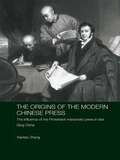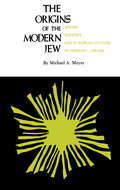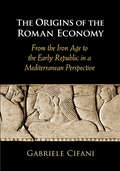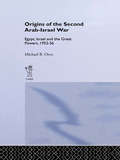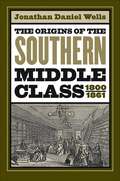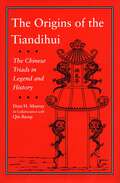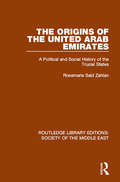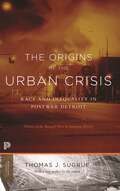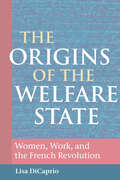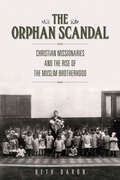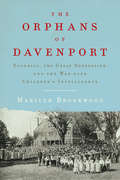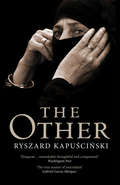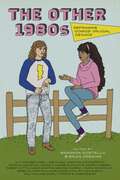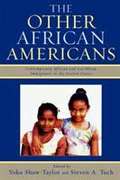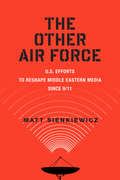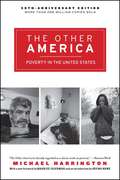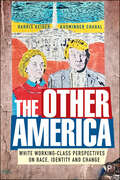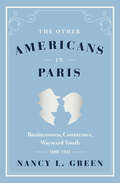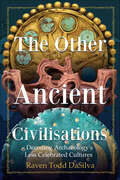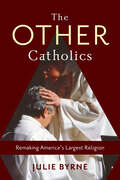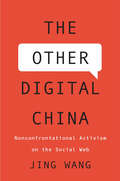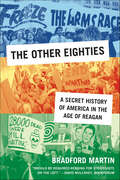- Table View
- List View
The Origins of the Modern Chinese Press: The Influence of the Protestant Missionary Press in Late Qing China (Media, Culture and Social Change in Asia #6)
by Xiantao ZhangThis book traces the emergence of the modern Chinese press from its origins in the western Christian missionary press in the late nineteenth century. It shows how the western missionaries and their evangelical/educational newspapers changed the long-standing traditional practices, styles, content, print culture and printing technology of Chinese newspapers and, in the process, introduced some of the key ideas of western modernity which were to have a profound effect on Chinese society. Xiantao Zhang demonstrates how missionary publications reshaped print journalism, rather indirectly, from a centuries-long monopoly by the state - the Imperial press - into a pluralized, modernizing and frequently radical public journalism. She focuses in particular on the relationship between the missionaries and the class of ‘gentry scholars’ - literati and civil servants, educated via the traditional state examination system in the Confucian classics, who were the prime target readers of the missionary publications. This key group and the independent press they established at the end of the nineteenth century played a crucial role in shaping the ongoing struggle for a modern democratic media culture in China.
The Origins of the Modern Jew: Jewish Identity and European Culture in Germany, 1749-1824
by Michael A. MeyerAn excellent overview of the intellectual history of important figures in German Jewry.
The Origins of the Roman Economy: From the Iron Age to the Early Republic in a Mediterranean Perspective
by Gabriele CifaniIn this book, Gabriele Cifani reconstructs the early economic history of Rome, from the Iron Age to the early Republic. Bringing a multidisciplinary approach to the topic, he argues that the early Roman economy was more diversified than has been previously acknowledged, going well beyond agriculture and pastoralism. Cifani bases his argument on a systematic review of archaeological evidence for production, trade and consumption. He posits that the existence of a network system, based on cultural interaction, social mobility, and trade, connected Rome and central Tyrrhenian Italy to the Mediterranean Basin even in this early period of Rome's history. Moreover, these trade and cultural links existed in parallel to regional, diversified economies, and institutions. Cifani's book thus offers new insights into the economic basis for the rise of Rome, as well as the social structures of Mediterranean Iron Age societies.
The Origins of the Second Arab-Israel War: Egypt, Israel and the Great Powers, 1952-56
by Michael B. OrenThis book represents the first scholarly examination of the origins of the 1956 Sinai campaign between Egypt and Israel. Utilising a wide range of primary sources, the study analyses the reasons for the breakdown of the Armistice Agreement between Egypt and Israel and the failure of efforts to mediate a peace accord.
The Origins of the Southern Middle Class, 1800-1861
by Jonathan Daniel WellsWith a fresh take on social dynamics in the antebellum South, Jonathan Daniel Wells contests the popular idea that the Old South was a region of essentially two classes (planters and slaves) until after the Civil War. He argues that, in fact, the region had a burgeoning white middle class--including merchants, doctors, and teachers--that had a profound impact on southern culture, the debate over slavery, and the coming of the Civil War.Wells shows that the growth of the periodical press after 1820 helped build a cultural bridge between the North and the South, and the emerging southern middle class seized upon northern middle-class ideas about gender roles and reform, politics, and the virtues of modernization. Even as it sought to emulate northern progress, however, the southern middle class never abandoned its attachment to slavery. By the 1850s, Wells argues, the prospect of industrial slavery in the South threatened northern capital and labor, causing sectional relations to shift from cooperative to competitive. Rather than simply pitting a backward, slave-labor, agrarian South against a progressive, free-labor, industrial North, Wells argues that the Civil War reflected a more complex interplay of economic and cultural values.
The Origins of the Tiandihui: The Chinese Triads in Legend and History
by Dian Murray Qin BaoqiThe Tiandihui, also known as the Heaven and Earth Association or the Triads, was one of the earliest, largest, and most enduring of the Chinese secret societies that have played crucial roles at decisive junctures in modern Chinese history. These organizations were characterized by ceremonial rituals, often in the form of blood oaths, that brought people together for a common goal. Some were organized for clandestine, criminal, or even seditious purposes by people alienated from or at the margins of society. Others were organized for mutual protection or the administration of local activities by law-abiding members of a given community. The common perception in the twentieth century, both in China and in the West, was that the Tiandihui was founded by Chinese patriots in the seventeenth century for the purpose of overthrowing the Qing (Manchu) dynasty and restoring the Ming (Chinese). This view was put forward by Sun Yat-sen and other revolutionaries who claimed that, like the anti-Manchu founders of the Tiandihui, their goal was to strip the Manchus of their throne. The Chinese Nationalists (Guomindang) today claim the Tiandihui as part of their heritage. This book relates a very different history of the origins of the Tiandihui. Using Qing dynasty archives that were made available in both Beijing and Taipei during the last decades, the author shows that the Tiandihui was founded not as a political movement but as a mutual aid brotherhood in 1761, a century after the date given by traditional historiography. She contends that histories depicting Ming loyalism as the raison d'etre of the Tiandihui are based on internally generated sources and, in part, on the "Xi Lu Legend," a creation myth that tells of monks from the Shaolin Monastery aiding the emperor in fighting the Xi Lu barbarians. Because of its importance to the theories of Ming loyalist scholars and its impact on Tiandihui historiography as a whole, the author thoroughly investigates the legend, revealing it to be the product of later - not founding - generations of Tiandihui members and a tale with an evolution of its own. The seven extant versions of the legend itself appear in English translation as an appendix. This book thus accomplishes three things: it reviews and analyzes the extensive Tiandihui literature; it makes available to Western scholars information from archival materials heretofore seen only by a few Chinese specialists; and it firmly establishes an authoritative chronology of the Tiandihui's early history.
The Origins of the United Arab Emirates: A Political and Social History of the Trucial States (Routledge Library Editions: Society of the Middle East #15)
by Rosemarie Said ZahlanThe creation of the United Arab Emirates in 1971 ended a century and a half of the existence of the Trucial States in special treaty relations with Britain. This book, first published in 1978, describes the evolution of tribes and their rulers’ authority over time, and the tribes’ treaties with Britain as it sought to exercise imperial control over its trade routes. Analysing changes to society as well as the politics of the region, this book analyses the formation of the United Arab Emirates.
The Origins of the Urban Crisis: Race and Inequality in Postwar Detroit - Updated Edition (Princeton Classics #6)
by Thomas J. SugrueThe reasons behind Detroit’s persistent racialized poverty after World War IIOnce America's "arsenal of democracy," Detroit is now the symbol of the American urban crisis. In this reappraisal of America’s racial and economic inequalities, Thomas Sugrue asks why Detroit and other industrial cities have become the sites of persistent racialized poverty. He challenges the conventional wisdom that urban decline is the product of the social programs and racial fissures of the 1960s. Weaving together the history of workplaces, unions, civil rights groups, political organizations, and real estate agencies, Sugrue finds the roots of today’s urban poverty in a hidden history of racial violence, discrimination, and deindustrialization that reshaped the American urban landscape after World War II.This Princeton Classics edition includes a new preface by Sugrue, discussing the lasting impact of the postwar transformation on urban America and the chronic issues leading to Detroit’s bankruptcy.
The Origins of the Welfare State: Women, Work, and the French Revolution
by Lisa DiCaprioWomen workers and the revolutionary origins of the modern welfare state In May 1790, the French National Assembly created spinning workshops (ateliers de filature) for thousands of unemployed women in Paris. These ateliers disclose new aspects of the process which transformed Old Regime charity into revolutionary welfare initiatives characterized by secularization, centralization, and entitlements based on citizenship. This study is the first to examine women and the welfare state in its formative period at a time when modern concepts of human rights were elaborated. In The Origins of the Welfare State, Lisa DiCaprio reveals how the women working in the ateliers, municipal welfare officials, and the national government vied to define the meaning of revolutionary welfare throughout the Revolution. Presenting demands for improved wages and working conditions to a wide array of revolutionary officials, the women workers exercised their rights as "passive citizens" capaciously and shaped the meanings of work, welfare, and citizenship. Looking backward to the Old Regime and forward to the nineteenth century, this study explores the interventionist spirit that characterized liberalism in the eighteenth century and serves as a bridge to the history of entitlements in the nineteenth and twentieth centuries.
The Orillia Spirit: An Illustrated History of Orillia
by Randy Richmond James A. McgarveyThe history of Orillia, told through the stories of its people, bringing to life the community’s heritage and significance. The Orillia Spirit: Muddling through Canada’s first, and hilarious, experiment with daylight savings time, Mayor “Daylight Bill” Frost had it. Creating his own money and dreaming a drainage ditch would become a tourist attraction, Mayor Ben Johnson had it. Taking his town’s electric company by force, Mayor J.B. Tudhope had it. Inventing early forms of medicare and the first RVs, dreaming of universities and folk festivals, battling for decades over liquor and rinks, ordinary people had it. Something about the place immortalized in Stephen Leacock’s classic Sunshine Sketches of a Little Town has always inspired its people to reach for their dreams. Turn-of-the-twentieth-century leaders coined the phrase “the Orillia Spirit” to describe their drive to make the town a social, moral, and economic leader of Canada. The results have been comic, tragic, and heroic, as shown in this colourful history of Orillia.
The Orillia Spirit: An illustrated history of Orillia
by Randy RichmondThe Orillia Spirit tells the history of the city through the stories of its people, who insisted on making their lives and their community alive with significance.
The Orphan Scandal: Christian Missionaries and the Rise of the Muslim Brotherhood
by Beth BaronOn a sweltering June morning in 1933 a fifteen-year-old Muslim orphan girl refused to rise in a show of respect for her elders at her Christian missionary school in Port Said. Her intransigence led to a beating#151;and to the end of most foreign missions in Egypt#151;and contributed to the rise of Islamist organizations. Turkiyya Hasan left the Swedish Salaam Mission with scratches on her legs and a suitcase of evidence of missionary misdeeds. Her story hit a nerve among Egyptians, and news of the beating quickly spread through the country. Suspicion of missionary schools, hospitals, and homes increased, and a vehement anti-missionary movement swept the country. That missionaries had won few converts was immaterial to Egyptian observers: stories such as Turkiyya's showed that the threat to Muslims and Islam was real. This is a great story of unintended consequences: Christian missionaries came to Egypt to convert and provide social services for children. Their actions ultimately inspired the development of the Muslim Brotherhood and similar Islamist groups. In The Orphan Scandal, Beth Baron provides a new lens through which to view the rise of Islamic groups in Egypt. This fresh perspective offers a starting point to uncover hidden links between Islamic activists and a broad cadre of Protestant evangelicals. Exploring the historical aims of the Christian missions and the early efforts of the Muslim Brotherhood, Baron shows how the Muslim Brotherhood and like-minded Islamist associations developed alongside and in reaction to the influx of missionaries. Patterning their organization and social welfare projects on the early success of the Christian missions, the Brotherhood launched their own efforts to "save" children and provide for the orphaned, abandoned, and poor. In battling for Egypt's children, Islamic activists created a network of social welfare institutions and a template for social action across the country#151;the effects of which, we now know, would only gain power and influence across the country in the decades to come.
The Orphans of Davenport: Eugenics, The Great Depression, And The War Over Children's Intelligence
by Marilyn BrookwoodThe fascinating—and eerily timely—tale of the forgotten Depression-era psychologists who launched the modern science of childhood development. “Doomed from birth” was how psychologist Harold Skeels described two toddler girls at the Iowa Soldiers’ Orphans’ Home in Davenport, Iowa, in 1934. Their IQ scores, added together, totaled just 81. Following prevailing eugenic beliefs of the times, Skeels and his colleague Marie Skodak assumed that the girls had inherited their parents’ low intelligence and were therefore unfit for adoption. The girls were sent to an institution for the “feebleminded” to be cared for by “moron” women. To Skeels and Skodak’s astonishment, under the women’s care, the children’s IQ scores became normal. Now considered one of the most important scientific findings of the twentieth century, the discovery that environment shapes children’s intelligence was also one of the most fiercely contested—and its origin story has never been told. In The Orphans of Davenport, psychologist and esteemed historian Marilyn Brookwood chronicles how a band of young psychologists in 1930s Iowa shattered the nature-versus-nurture debate and overthrew long-accepted racist and classist views of childhood development. Transporting readers to a rural Iowa devastated by dust storms and economic collapse, Brookwood reveals just how profoundly unlikely it was for this breakthrough to come from the Iowa Child Welfare Research Station. Funded by the University of Iowa and the Rockefeller Foundation, and modeled on America’s experimental agricultural stations, the Iowa Station was virtually unknown, a backwater compared to the renowned psychology faculties of Stanford, Harvard, and Princeton. Despite the challenges they faced, the Iowa psychologists replicated increased intelligence in thirteen more “retarded” children. When Skeels published their incredible work, America’s leading psychologists—eugenicists all—attacked and condemned his conclusions. The loudest critic was Lewis M. Terman, who advocated for forced sterilization of low-intelligence women and whose own widely accepted IQ test was threatened by the Iowa research. Terman and his opponents insisted that intelligence was hereditary, and their prestige ensured that the research would be ignored for decades. Remarkably, it was not until the 1960s that a new generation of psychologists accepted environment’s role in intelligence and helped launch the modern field of developmental neuroscience.. Drawing on prodigious archival research, Brookwood reclaims the Iowa researchers as intrepid heroes and movingly recounts the stories of the orphans themselves, many of whom later credited the psychologists with giving them the opportunity to forge successful lives. A radiant story of the power and promise of science to better the lives of us all, The Orphans of Davenport unearths an essential history at a moment when race science is dangerously resurgent.
The Other
by Ryszard KapuscinskiIn this distillation of reflections accumulated from a lifetime of travel, Ryszard Kapuscinski takes a fresh look at the Western idea of the Other. Looking at this concept through the lens of his own encounters in Africa, Asia and Latin America, and considering its formative significance for his own work, Kapuscinski traces how the West has understood the non-European from classical times to the present day. He observes how in the twenty-first century we continue to treat the residents of the Global South as hostile aliens, objects of study rather than full partners sharing responsibility for the fate of humankind.In our globalised but increasingly polarised world, Kapuscinski shows how the Other remains one of the most compelling ideas of our times.
The Other 1980s: Reframing Comics’ Crucial Decade
by Paul Williams Andrew Hoberek Blair Davis Daniel F. Yezbick Shiamin Kwa Maaheen Ahmed Andrew J. Kunka Robert Hutton José Alaniz Rachel Miller Jonathan Alexandratos Peter Cullen Bryan Jeremy Carnes Aaron Kashtan Meg King Isabelle Licari-Guillaume Alex B. Smith James ZeiglerFans and scholars have long regarded the 1980s as a significant turning point in the history of comics in the United States, but most critical discussions of the period still focus on books from prominent creators such as Frank Miller, Alan Moore, and Art Spiegelman, eclipsing the work of others who also played a key role in shaping comics as we know them today. The Other 1980s offers a more complicated and multivalent picture of this robust era of ambitious comics publishing. The twenty essays in The Other 1980s illuminate many works hailed as innovative in their day that have nonetheless fallen from critical view, partly because they challenge the contours of conventional comics studies scholarship: open-ended serials that eschew the graphic-novel format beloved by literature departments; sprawling superhero narratives with no connection to corporate universes; offbeat and abandoned experiments by major publishers, including Marvel and DC; idiosyncratic and experimental independent comics; unusual genre exercises filtered through deeply personal sensibilities; and oft-neglected offshoots of the classic “underground” comics movement of the 1960s and 1970s. The collection also offers original examinations of the ways in which the fans and critics of the day engaged with creators and publishers, establishing the groundwork for much of the contemporary critical and academic discourse on comics. By uncovering creators and works long ignored by scholars, The Other 1980s revises standard histories of this major period and offers a more nuanced understanding of the context from which the iconic comics of the 1980s emerged.
The Other African Americans: Contemporary African and Caribbean Immigrants in the United States
by Yoku Shaw-Taylor ; Steven A. TuchDespite their growing presence, research on Caribbean and, especially, African immigrants has been scant. The scarcity of writings on these "other" African Americans contributes to the invisibility of these groups. The objective of this project is to broaden our understanding of these other African Americans. A focus on intra-racial dynamics among African Americans is important because of the ever-growing diversity of America's black population. The Other African Americans is an edited volume of original research that provides historical and contemporary information on African and Caribbean individuals and families. Each chapter addresses a particular topical area covering the most salient issues facing these immigrants to the U.S. today.
The Other Air Force: U.S. Efforts to Reshape Middle Eastern Media Since 9/11
by Mr Matt SienkiewiczAs it seeks to win the hearts and minds of citizens in the Muslim world, the United States has poured millions of dollars into local television and radio programming, hoping to generate pro-American currents on Middle Eastern airwaves. However, as this fascinating new book shows, the Middle Eastern media producers who rely on these funds are hardly puppets on an American string, but instead contribute their own political and creative agendas while working within U.S. restrictions. The Other Air Force gives readers a unique inside look at television and radio production in Afghanistan and the Palestinian territories, from the isolated villages of the Afghan Panjshir Valley to the congested streets of Ramallah. Communications scholar Matt Sienkiewicz explores how the U.S. takes a "soft-psy" approach to its media efforts combining "soft" methods of encouraging entertainment programming, such as adaptations of The Voice and The Apprentice with more militaristic "psy-ops" approaches to information control. Drawing from years of field research and interviews with everyone from millionaire executives to underpaid but ever resourceful cameramen, Sienkiewicz considers the perspectives of the Afghan and Palestinian media workers trying to forge viable broadcasting businesses without straying outside American-set boundaries for acceptable content. As it carefully examines the interplay of U.S. military and economic might with the capacity for local ingenuity and resistance, the book also analyzes the intriguingly complex programming that emerges from this tension. Combining eyewitness reportage with cutting-edge scholarship, The Other Air Force reveals the remarkable creative output that can emerge even from the world's tensest conflict zones.
The Other America: Poverty in the United States
by Michael HarringtonIn the fifty years since it was published, The Other America has been established as a seminal work of sociology. This anniversary edition includes Michael Harrington’s essays on poverty in the 1970s and ’80s as well as a new introduction by Harrington’s biographer, Maurice Isserman. This illuminating, profoundly moving classic is still all too relevant for today’s America.When Michael Harrington’s masterpiece, The Other America, was first published in 1962, it was hailed as an explosive work and became a galvanizing force for the war on poverty. Harrington shed light on the lives of the poor—from farm to city—and the social forces that relegated them to their difficult situations. He was determined to make poverty in the United States visible and his observations and analyses have had a profound effect on our country, radically changing how we view the poor and the policies we employ to help them.
The Other America: White Working Class Perspectives on Race, Identity and Change
by Harris Beider Kusminder ChahalWidely stereotyped as anti-immigrant, against civil-rights or supporters of Trump and the right, can the white working class of America really be reduced to a singular group with similar views? Based on extensive interviews across five cities at a crucial point in US history, this significant book showcases what the white working class think about many of the defining issues of the age - from race, identity and change to the crucial on-the-ground debates occurring at the time of the 2016 US election. As the 2020 presidential elections draw near, this is an invaluable insight into the complex views on Donald Trump and Hillary Clinton, and the extent and reach they have to engage in cross-racial connections.
The Other Americans in Paris: Businessmen, Countesses, Wayward Youth, 1880–1941
by Nancy L. GreenA &“thorough and perceptive&” portrait of the not-so-famous expatriates of the City of Light (The Wall Street Journal). History may remember the American artists, writers, and musicians of the Left Bank best, but the reality is that there were many more American businessmen, socialites, manufacturers&’ representatives, and lawyers living on the other side of the River Seine. Be they newly minted American countesses married to foreigners with impressive titles or American soldiers who had settled in France after World War I with their French wives, they provide a new view of the notion of expatriates. Historian Nancy L. Green introduces us for the first time to a long-forgotten part of the American overseas population—predecessors to today&’s expats—while exploring the politics of citizenship and the business relationships, love lives, and wealth (or in some cases, poverty) of Americans who staked their claim to the City of Light. The Other Americans in Paris shows that elite migration is a part of migration, and that debates over Americanization have deep roots in the twentieth century.
The Other Ancient Civilizations: Decoding Archaeology's Less Celebrated Cultures
by Raven Todd DaSilva&“A captivating journey&” through 15,000 years of fascinating yet often-forgotten ancient civilizations and cultures—includes maps and illustrations (Natasha Billson, host, The Great British Dig). From the world's first peace treaty to daring expeditions across the Pacific, this book explores twenty ancient and historic cultures that have had monumental impacts on our modern world—but that few people know about. Archaeologist Raven Todd DaSilva, creator of the popular platform Dig It With Raven, looks beyond the familiar names and places and delves into astounding finds unearthed at archaeological sites around the globe. Discover the archaeology that sheds light on the secret stories of the Nubians, Olmec, Xiongnu, Minoans, Akkadians, and many more. Rather than focusing only on great rulers and monumental buildings, the book highlights the everyday lives of peoples of the past, who they interacted with, and what we can learn from them. Packed with summaries of current archaeological evidence, detailed maps, and striking images of artefacts and sites, The Other Ancient Civilizations reveals how archaeologists decode ancient cultures from what they left behind—and is an indispensable collection of fascinating stories and facts that illustrate both the differences and similarities between us and our long-distant ancestors. &“A succinct journey through some of the world&’s less well-known complex societies … excellent, thoroughly researched, and admirably illustrated.&” —Brian Fagan, author of People of the Earth
The Other Catholics: Remaking America's Largest Religion
by Julie ByrneIndependent Catholics are not formally connected to the pope in Rome. They practice apostolic succession, seven sacraments, and devotion to the saints. But without a pope, they can change quickly and experiment freely, with some affirming communion for the divorced, women's ordination, clerical marriage, and same-sex marriage. From their early modern origins in the Netherlands to their contemporary proliferation in the United States, these "other Catholics" represent an unusually liberal, mobile, and creative version of America's largest religion.In The Other Catholics, Julie Byrne shares the remarkable history and current activity of independent Catholics, who number at least two hundred communities and a million members across the United States. She focuses in particular on the Church of Antioch, one of the first Catholic groups to ordain women in modern times. Through archival documents and interviews, Byrne tells the story of the unforgettable leaders and surprising influence of these understudied churches, which, when included in Catholic history, change the narrative arc and total shape of modern Catholicism. As Pope Francis fights to soften Roman doctrines with a pastoral touch and his fellow Roman bishops push back with equal passion, independent Catholics continue to leap ahead of Roman reform, keeping key Catholic traditions but adding a progressive difference.
The Other Catholics: Remaking America's Largest Religion
by Julie Byrne&“An excellent study of churches on the fringe that incubate new ideas and shed new light on mainstream religion.&”—Times Higher Education Independent Catholics are not formally connected to the pope in Rome. They practice apostolic succession, seven sacraments, and devotion to the saints. But without a pope, they can change quickly and experiment freely—with some affirming communion for the divorced, women&’s ordination, clerical marriage, and same-sex marriage. From their early modern origins in the Netherlands to their contemporary proliferation in the United States, these &“other Catholics&” represent an unusually liberal, mobile, and creative version of America&’s largest religion. In The Other Catholics, Julie Byrne shares the remarkable history and current activity of independent Catholics, who number at least two hundred communities and a million members across the United States. She focuses in particular on the Church of Antioch, one of the first Catholic groups to ordain women in modern times. Through archival documents and interviews, Byrne tells the story of the unforgettable leaders and surprising influence of these understudied churches, which, when included in Catholic history, change the narrative arc and total shape of modern Catholicism. As Pope Francis fights to soften Roman doctrines with a pastoral touch and his fellow Roman bishops push back with equal passion, independent Catholics continue to leap ahead of Roman reform, keeping key Catholic traditions but adding a progressive difference. &“Byrne&’s enlightening research and analysis will undoubtedly raise awareness of these little-known Catholic denominations.&”
The Other Digital China: Nonconfrontational Activism on the Social Web
by Jing WangWesterners tend to equate political action with revolution and open criticism, leading to concerns that the less outspoken citizens of nonliberal societies are brainwashed, complicit, or paralyzed by fear. Jing Wang shatters this myth, showing how online activists in China are quietly building powerful coalitions for incremental social change.
The Other Eighties: A Secret History of America in the Age of Reagan
by Bradford MartinIn this engaging new book, Bradford Martin illuminates a different 1980s than many remember—one whose history has been buried under the celebratory narrative of conservative ascendancy. Ronald Reagan looms large in most accounts of the period, encouraging Americans to renounce the activist and liberal politics of the 1960s and ‘70s and embrace the resurgent conservative wave. But a closer look reveals that a sizable swath of Americans strongly disapproved of Reagan's policies throughout his presidency. With a weakened Democratic Party scurrying for the political center, many expressed their dissatisfaction outside electoral politics. Unlike the civil rights and Vietnam era protesters, activists of the 1980s often found themselves on the defensive, struggling to preserve the hard-won victories of the previous era. Their successes, then, were not in ushering in a new era of progressive reforms but in effecting change in areas from professional life to popular culture, while beating back an even more forceful political shift to the right. Martin paints an indelible portrait of these and other influential, but often overlooked, movements: from on-the-ground efforts to constrain the administration's aggressive Latin American policy and stave off a possible Nicaraguan war, to mock shanties constructed on college campuses to shed light on corporate America's role in supporting the apartheid regime in South Africa. The result is a clearer, richer perspective on a turbulent decade in American life.
